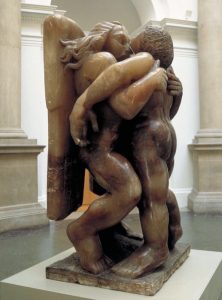 This is an essay in the truest sense of the word—an attempt.
This is an essay in the truest sense of the word—an attempt.
I felt challenged by three positions taken by our provincial chapter of 2017. It was our second chapter after merging three provinces into one. The first had been an experience in trust-building and an administrative effort to write our province directory. This second one, at the will of the first, was aimed at harvesting the fruit of a year-long discernment process lived in all the province communities and at an assembly of school leaders. It was set—in time and in décor—during the Year of Consecrated Life, whose theme was “Wake up the World.”
The first thing that challenged me was what Pope Francis said to those of us in consecrated life: “This is a special time for celebrating the gift of your vocation and for reviving your prophetic mission. Leave your nest, and go out to the peripheries of today’s men and women. By allowing yourselves to be encountered by Christ there, the Lord in turn will push you toward an encounter with others, and bring you to those most in need, to the poorest.”
Related to that call from the ‘pope of the peripheries,’ the second thing that struck me was the unanimity and peace surrounding the chapter’s vote on what it called a “Core Statement” distilled by the discernment team from the results of the province-wide process. The statement defined clearly the spirituality of the Sacred Heart that the chapter wants to foster among us brothers, lay partners and colleagues, and the young people at the heart of our mission. It reads like an article in the Rule of Life:
The United States Province
is called to be prophetic
by being the compassionate Heart of Jesus.
We live a practical, compassionate love
that compels us to minister to one another
and to those on the periphery,
especially the young.
My third challenge came from how strongly the chapter considered our lay partners to be a singular grace and a multitude of hope for our future. It believed sincerely that God is building the U.S. province into a dynamic and diverse force to promote what some erroneously call “the brothers’ mission.” Since lay men and women make up the very fabric of the US province network, they are inherent to what we now consider a shared mission.
Those three challenges—graces—ultimately gave me a desire to attempt formulating a “new expression of the spirituality of the Heart of Jesus” in a way that can be meaningful to all: brothers, lay partners in mission, and the young people whose lives touch ours.[1] This attempt endeavors to harmonize the core statement of the chapter with our lived experience over 200 years: the spiritual lives of our institute’s founders and early brothers, the laity in our wider communion, our Rule of Life, superiors general, and the pioneers who have shown us what it means to strike out for the periphery and make it into a sanctuary.
After more than a year’s work, this expression of our spirituality is only, and always will be, an attempt. And an offering open to correction, completion, and collaboration by you and all who share the mission of the institute to give young people a holistic human formation in the perspective of their eternal destiny.[2]
Please pray with me for increased spiritual desire to attempt to live it in my life.
![]()
Brother Bernard Couvillion, SC, United States Province
Bay Saint Louis, Mississippi, January 9, 2019
Feast of Venerable Brother Polycarp +1859
Set up a Confidential Discernment Journal on your PC
A Basis in Human Psychology: Abraham Maslow’s Missing Apex
https://en.wikipedia.org/wiki/Abraham_Maslow
A Prayer for Spiritual Desire
God my Creator,
You breathed into me divine possibilities.
You have always drawn me beyond myself
by stoking my heart with pangs of desire—
– when newborn, for the caress of affection
– after my first steps, for a firm, safe guiding hand
– beyond home, for reassuring smiles of friendship and
belonging
– as a student, for the poise that comes from success and
esteem
– grown up, for a sense of achievement and for the touch of
love sealed by the elation of partaking
in Your act of creation.
Intensify my desire to feed my spiritual life
and to feel the mystery of your presence deep in my heart.
Impel me to live beyond my own cause and my lesser longings.
Make my vocation resonate with the movements of your divine Spirit
so that those who need your loving presence and compassion
might discover You made flesh through me.
All this I pray through Jesus Christ, your image, my ideal and my brother. Amen.
Prayer of Longing for God Steve Angrisano: Video
Contemplating Scenes from the Scriptures
Jesus, the Woman, and the Well John 4: 4-26
- To get in touch with the pull within the Samaritan woman between spiritual and human desires, first view some videos, then read and contemplate the Gospel story.
The Samaritan Woman animated version
Urban Version
LDS version
In the way Jesus and the woman spoke, I ask God to be present and to listen as I express the ambiguities between my deepest spiritual desires: where I want to grow, peak moments in my spiritual awareness for which I am grateful, what I hope can be renewed deep in my spirit, what spiritual struggles have marked me.
Jacob Wrestling with God Genesis 32: 23-31
liturgical reading with action
Sculpture: Jacob Wrestles through the Night Sir Jacob Epstein — Tate Gallery 


Commentary: The subject of Jacob and the Angel fascinated the sculptor and may have had personal significance, not least because of the fact that Epstein’s first name was Jacob. In the carving, the night-long struggle between Jacob and his assailant is translated into a strangely ambiguous embrace between two colossal male figures. Jacob is depicted with his eyes closed and head thrown back; the angel is holding him in a tight grasp, as if squeezing his last breath from him. The Herculean proportions of the figures permitted the sculptor to generalize and balance the relationship of the masses while simultaneously maintaining the impact of their embrace. True to his usual practice in carving, the primary views reflect the mass of the original block, but the interlocked arms also encourage the viewer to move around it.
Reflective reading
The tensions between spiritual longings and human limitations cause us wrestle with God as Jacob, Adam, Abraham, and Jesus did.
Will You Wrestle with God?

What do you really need from God right now? What blessing do you want from him? How badly do you want it?
There are times when God only releases blessings on us after a season of prolonged and even painful wrestling with him.
Strangest Wrestling Match in History
In Genesis 32, Jacob is on his way back home to Canaan with his small tribe of wives and children after a twenty years his older brother Esau whom he had cheated out of his inheritance. And he is scared to death, because his Esau, is coming to meet him — with four hundred men (Genesis 32:6). This is no welcome party; it’s an army.
So after splitting up his household into two camps to try and avoid complete annihilation, Jacob, understandably suffering insomnia, intends to spend the night alone — no doubt in desperate prayer.
“All of our struggling with God in faith leads to peace.”
But a strange man who shows up and wrestles Jacob till daybreak rudely interrupts his plans. At some point during this weird contest Jacob realizes that he is wrestling God. And when God decides it’s time to end the match, he dislocates Jacob’s hip and demands to be released. And Jacob, in significant pain, replies, “I will not let you go unless you bless me” (Genesis 32:26).
This response clearly pleases God, who pronounces this blessing on Jacob: “Your name shall no longer be called Jacob [deceiver], but Israel [strives with God], for you have striven with God and with men, and have prevailed” (Genesis 32:28).
Jacob then limps toward his tense reunion with Esau with a weakened body and a strengthened faith. Having wrestled with God, he knows his prayers regarding Esau will be answered.
Blessings Through Wrestling
Take note of what God did when he wrestled Jacob. Jacob began the night dreading Esau’s arrival. He was full of fear and desperation. But he ended the night of struggle with God’s blessing and a renewed faith. All of our struggling with God in faith leads to peace.
And isn’t it interesting that God did not simply speak to Jacob in a dream or vision as he had at other times (Genesis 31:13) and reiterate his promise and speak comforting words? This time God addressed Jacob’s fear by requiring him to wrestle all night. This probably felt to Jacob like a badly timed hassle when he just wanted comfort and assurance. But later he realized just how comforting it was. Sometimes when we want God’s comfort, he sends it in unexpected and even unwanted packages.
“If necessary, God will cause us to limp to increase our faith.”
God even afflicted Jacob with a debilitating injury. This had the effect of making Jacob even more vulnerable to Esau, forcing Jacob’s faith to more fully rest on God and not himself. If necessary, God will cause us to limp to increase our faith.
Lastly, wrestling with God changed Jacob’s identity. He was no longer to be known as one who received his blessing by deception. This time he received God’s blessing by prevailing with God by faith. This struggle turned out to be a profoundly gracious gift of restoration that God gave Jacob, not unlike the gift Jesus gave Peter by letting Peter affirm his love for Jesus as many times as he had denied it (John 21:15–17). Jacob’s tenacious faith pleased God and he rewarded Jacob’s request (Hebrews 11:6). When God calls us to wrestle with him, there’s always more going on than we first understand and God always uses it to transform us for good.
God Wants to Bless You
When God makes us wrestle him for some blessing(s), it is not because God is reluctant to bless us, even if that’s how it first feels. It is because he has more blessings for us in the wrestling than without it.
Remember, God pursued Jacob for this match. God was the initiator. Jacob was stewing in his own anxiety over Esau and his approaching slaughter squad when God showed up. And the wrestling drew Jacob out of his fearful preoccupation and forced him to focus on God.
I doubt that Jacob wanted this forced focus or even believed he needed it at first. It wouldn’t surprise me if at the beginning Jacob had prayed, “God would you get rid of this guy? This is the last thing I need right now.” But what he discovered was that the wrestling was a means of God’s grace, a channel for God’s blessing on him.
The same is true for us.
Keep Wrestling
So I’ll ask again. What do you really need from God right now? What blessing do you want from him? How badly do you want it?
“Do not let God go until he blesses you.”
God will meet you in your doubts, hesitations, anguish, fear, and uncertainty. But God usually does not meet you in the way you expect or desire. Your greatest ally may show up looking at first like your adversary, inciting you to wrestle with him.
If so, remember Jacob. There are multiple blessings in the wrestling. You may not need soft words of comfort, you may not need to be left alone with your thoughts, you may not need sleep, you may not even need a healthy hip! What you need is God’s blessing!
So when God calls you to wrestle with him in prayer, it is an invitation to receive his blessing. Stay with God and don’t give up. Do not let loose until you receive a blessing! God loves to bless that kind of tenacious faith and you will come out transformed.
Praying the Psalms. The book of psalms was Jesus’ prayer book. Through the psalms Jesus wrestled with his father and received blessings from God.
Psalm 42: 1-5 http://www.usccb.org/bible/psalms/42
https://uca.edu/bewell/files/2020/11/Feelings-Wheel-Learn-How-to-Label-Your-Feelings.pdf
Listen to Communal Songs of Longing for God
Jesus, Come to Us
The Call (Isabel Davis)
More from Maslow : Transcendence and Peak Experiences
Edited from an article by John G. Messerly, an Affiliate Scholar of the Institute for Ethics & Emerging Technologies, reprinted in its online magazine of February 4, 2017.
It is quite true that [we live] by bread alone—when there is no bread. But what happens to [our] desires when there is plenty of bread and when [our bellies are] chronically filled? – Abraham Maslow
What is not well-known is that Maslow amended his view of human desire near the end of his life, and so the conventional portrayal of his hierarchy of needs is inaccurate, as it omits a description of his later thought. In his earlier career, he considered “self-actualization” as the highest human need built into our desires. In his later thinking, he argued that we can experience a higher level of development, what he called self-transcendence, by focusing on some higher goal outside ourselves. Examples include altruism, or spiritual awakening or liberation from egocentricity. Here is how he put it:
- Maslow makes a succinct and eloquent statement of the difference between self-actualization and self-transcendence: At the level of self-actualization, the individual works to realize his or her own potential [whereas] at the level of transcendence, the individual’s own needs are put aside, to a great extent, in favor of love for and service to others.
- Transcendence refers to the very highest and most inclusive or holistic levels of human consciousness, behaving and relating, as ends rather than means, to oneself, to significant others, to human beings in general, to other species, to nature, and to the cosmos. (The Farther Reaches of Human Nature , New York, 1971, p. 269.)
- Placing self-transcendence above self-actualization results in a radically different view of what it means to be human. While self-actualization refers to fulfilling our own potential, self-transcendence puts our own needs aside to serve something greater than ourselves. In the process, self-transcenders may have what Maslow called peak experiences, in which they transcend personal concerns. In such spiritual, aesthetic, or emotional states one feels intense joy, peace, well-being, and an awareness of ultimate truth and the unity of all things.
- Maslow spoke of “peak moments” of transcendence. He also believed that such states aren’t always transitory—some people might be able to readily access them. This led him to define another term, “plateau experience.” These are more lasting, serene, and cognitive states. In plateau experiences one feels not only ecstasy, but the sadness that comes with realizing that others cannot have similar encounters. While Maslow believed that self-actualized, mature people are those most likely to have these self-transcendent experiences, he also felt that everyone was capable of having them.
- Given that Maslow’s humanistic psychology emphasized self-actualization and what is right with people, it isn’t surprising that his later transpersonal psychology explored extreme wellness or optimal well-being. This took the form of interest in persons who have expanded their normal sense of identity to include the transpersonal, or the underlying unity of all reality. (There is a connection between his transpersonal psychology and the mystical and meditative traditions of the world’s religions.)
-
- Finally, Maslow’s conclusion that self-transcendence is the highest level of psychological development reminds me of the thinking of Victor Frankl, in Man’s Search for Meaning,one of the most profound books ever written. Frankl states: “… the true meaning of life is to be found in the world rather than within [our own] psyche … Self-actualization is not a possible aim at all; for the simple reason that the more we would strive for it, the more we would miss it. Only to the extent to which we commit ourselves to the fulfillment of our life’s meaning, to this extent we also actualize ourselves. In other words, self-actualization cannot be attained if it is made an end in itself, but only as a side-effect of self-transcendence.
Listening and Mutual Support
We now exchange about:
— your desires for a personal vocation leading to spiritual transcendence
— tensions you experience between your desire for transcendence and the pressures of daily life
— the readings and prayers that meant most to you.
Footnotes:
[1] cf. Resolution 15 of the provincial chapter of 2017
[2] Rule of Life 149

 Staff writer, desiringGod.org
Staff writer, desiringGod.org